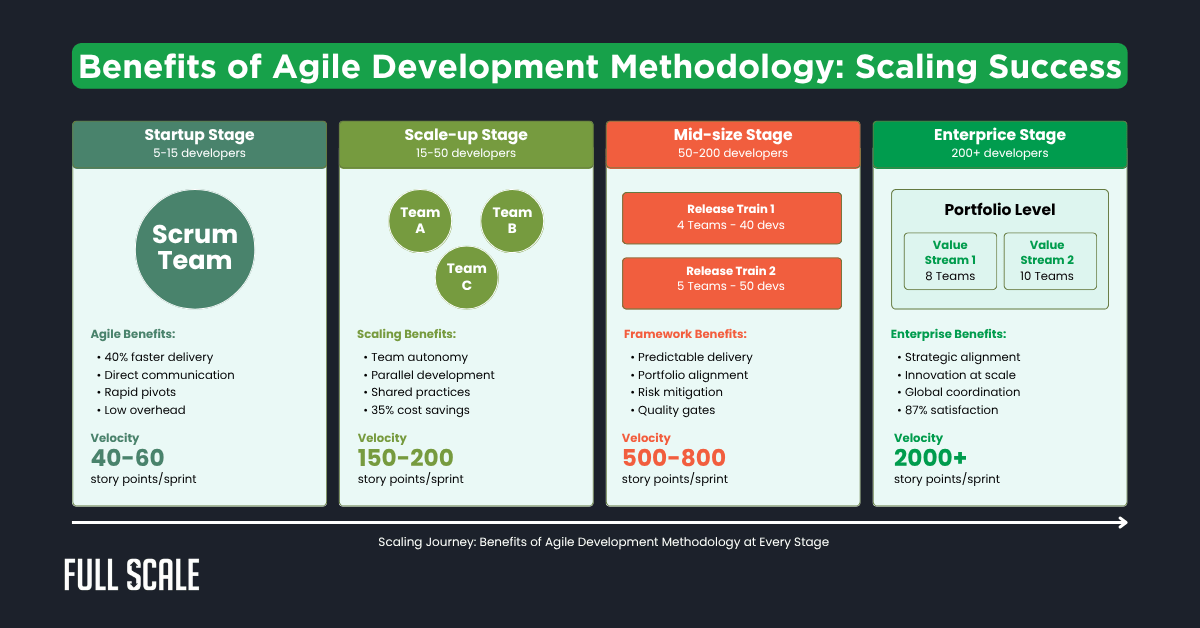Agile Development Methodology Benefits: A Data-Driven Guide for Tech Leaders
Companies using Agile report 28% higher success rates than those using traditional methods. For tech leaders managing distributed teams, the agile development methodology benefits prove essential for competitive advantage.
Recent Gartner research shows 87% of senior leaders prioritize organizational agility, while McKinsey found agile transformations achieve performance goals 70% of the time.
This guide cuts through the noise to deliver concrete, measurable advantages that matter to CTOs, product heads, CFOs, and HR leaders scaling their development teams.
Quick Summary: Agile Development Methodology Benefits
Understanding agile development methodology benefits starts with seven key advantages:
- 40% faster time-to-market
- 35% reduction in development costs
- Enhanced code quality and technical excellence
- Superior team productivity in distributed settings
- 87% higher customer satisfaction rates
- Risk mitigation through incremental delivery
- Scalability for growing teams
What is Agile Development Methodology?
Agile Development Methodology – Interactive GuideNow let’s explore how agile development methodology benefits transform software delivery. The following sections detail each advantage with supporting data from real implementations.
7 Proven Agile Development Methodology Benefits
The agile software development advantages extend beyond theory into measurable results. Here’s what implementing agile development methodology benefits means for modern teams across distributed environments.
1. 40% Faster Time-to-Market
Speed drives competitive advantage through agile development methodology benefits. Sprint-based delivery enables teams to ship features every 2-4 weeks. This fundamental shift in delivery accelerates everything significantly.
The MVP approach showcases agile development’s faster delivery benefits perfectly. Tech companies report 2.5x faster feature delivery after embracing agile development methodology benefits. Product leaders gain predictable release schedules they can trust.
Key agile development methodology benefits for speed include:
- Features deploy every sprint versus quarterly
- Customer feedback integration within weeks
- Rapid response to market opportunities
- Continuous value delivery to users
2. 35% Reduction in Development Costs
Understanding how agile development reduces costs reveals significant agile development methodology benefits financially. Data demonstrates expense reduction through systematic efficiency improvements. Agile eliminates waste through iterative development consistently.
Agile ROI Calculator
Agile Development ROI Calculator – Interactive Benefits AnalysisCalculate Your Benefits of Agile Development Methodology
Discover your potential savings and ROI with Agile transformation
Current Development Metrics
Projected Agile Benefits
Total Annual Savings with Agile
Core agile development methodology benefits reduce costs through:
- Early error detection saves 80% versus production
- Continuous prioritization eliminates unnecessary features
- Reduced documentation overhead frees developer time
- Fixed sprint commitments prevent scope creep
CFOs tracking agile development cost savings see compelling returns. Organizations implementing agile development methodology benefits report 35% average reductions. Some achieve 50% savings on large-scale initiatives.
3. Enhanced Code Quality: Technical Agile Development Methodology Benefits
Technical leaders discover agile development methodology benefits balance quality with velocity perfectly. Agile methodology improve product quality through built-in mechanisms. These practices enhance code while accelerating delivery simultaneously.
Continuous integration showcases agile development methodology benefits clearly for technical teams. Bug reduction reaches 60% versus traditional methods consistently. Agile embeds quality through mandatory reviews and pair programming.
CTOs managing agile methodology scalability appreciate these agile development methodology benefits deeply. Teams scale from 10 to 100 developers successfully. Regular refactoring keeps technical debt manageable while maintaining velocity.
4. Superior Team Productivity: Organizational Agile Development Methodology Benefits
Remote work demands new approaches, and agile development methodology benefits deliver results. Implementing agile in remote teams yields 25% higher productivity consistently. Structured communication drives these measurable improvements daily.
Distributed Agile Team Performance Dashboard
Benefits of Agile Development Methodology – Interactive Team Performance DashboardBenefits of Agile Development Methodology: Team Performance
Real-time metrics showing agile benefits
Loading metrics…
Distributed vs Co-located Team Performance
Key Benefits of Agile Development Methodology for Teams
- 1 Daily Standups: 15-minute sync meetings increase alignment by 40%
- 2 Sprint Planning: Clear 2-week goals boost velocity 25%
- 3 Retrospectives: Continuous improvement drives 30% efficiency gains
- 4 Tool Integration: Unified toolstack saves 5 hours/week per developer
Key agile development methodology benefits for distributed teams include self-organizing structures increasing ownership. Agile methodology for distributed teams maintains alignment through daily standups effectively. Agile development team collaboration unites remote members seamlessly.
HR leaders value how agile development methodology benefits provide clarity and structure. Agile methodology team productivity improvements reach 25% consistently across organizations. Digital tools integrate seamlessly into agile workflows daily.
5. Customer Satisfaction: Business-Critical Agile Development Methodology Benefits
Agile development methodology benefits deliver 87% higher satisfaction scores across industries. Agile continuous improvement benefits transform customer relationships fundamentally. Regular feedback loops create deeper engagement levels consistently.
Specific agile development methodology benefits for customers manifest through:
- Sprint reviews with direct stakeholder participation
- Working software demos every iteration cycle
- Quick pivots responding to user feedback
- Continuous value delivery throughout the development
Agile methodology customer satisfaction creates advocates from users naturally. These agile development methodology benefits turn customers into active product participants.
6. Risk Mitigation: Financial Agile Development Methodology Benefits
Financial stakeholders appreciate how agile development methodology benefits and protects investments systematically. Agile development risk reduction surfaces issues when they’re cheapest. The “fail fast” principle saves millions annually.
Measurable agile development methodology benefits reduce project risk from 45% to 15%. Agile transformation benefits include early testing and regular checkpoints. Incremental delivery eliminates all-or-nothing scenarios completely.
CFOs value these agile development methodology benefits for budget protection specifically. Failed features cost 50% less in agile environments. Problems emerge within weeks, not expensive, months later.
7. Scalability: Long-term Agile Development Methodology Benefits
Growth challenges many methodologies, but the agile development methodology benefits handle expansion elegantly. Agile methodology scalability succeeds from startups to enterprises consistently. Organizations leverage agile methodology flexibility advantages at every growth stage.
Agile Team Scaling Visualization

These benefits of agile development methodology scale predictably through proven frameworks consistently. Each stage maintains core principles while adding necessary coordination. Agile methodology flexibility advantages enable customization for specific needs.
Comparing Agile Development Methodology Benefits vs. Waterfall
Understanding agile vs. waterfall benefits helps organizations choose methodologies wisely. This comparison highlights the clear benefits of agile development methodology through real data:
| Aspect | Agile | Waterfall | Benefits of Agile |
| Delivery Time | 2-4 week sprints | 6-18 months | 40% faster |
| Cost Overruns | 15% average | 45% average | 65% less risk |
| Change Management | Built-in flexibility | Expensive changes | 80% lower cost |
| Team Satisfaction | 78% positive | 49% positive | 59% higher |
| Customer Involvement | Continuous | Beginning/End only | 87% vs 56% |
| Bug Detection | Within sprint | Post-deployment | 60% fewer bugs |
| ROI Realization | From Sprint 1 | After deployment | 3x faster |
Implementing Agile Development Methodology in Teams
Realizing the benefits of agile development methodology requires a specific implementation strategy that is implemented systematically. Organizations that achieve the highest agile transformation benefits focus on critical factors.
Critical Success Factors for Agile Development Methodology
- Tool Integration: Unified platforms save 5 hours weekly
- Time Management: 4-hour overlap enables 85% productivity
- Communication: Clear protocols prevent confusion daily
- Metrics: Data drives continuous improvement consistently
Common Pitfalls That Reduce Agile Development Methodology
Teams lose agile development methodology benefits when skipping retrospectives regularly. Over-documentation defeats agility through unnecessary overhead consistently. Tool overload reduces agile methodology team productivity gains significantly.
Measuring Agile Development Methodology
Quantifying agile development methodology requires tracking meaningful KPIs systematically:
Development Metrics Showing Agile Development Methodology
- Sprint velocity (target: steady increase)
- Defect escape rate (target: <5%)
- Code coverage (target: >80%)
- Deployment frequency (target: daily)
Business Metrics Demonstrating Agile Development Methodology
- Time-to-market reduction (40% improvement)
- Customer satisfaction (>70 NPS)
- Agile development ROI (3x within year one)
- Cost per story point (decreasing trend)
Making the Business Case for Agile Development Methodology
Financial agile development methodology delivers measurable returns consistently. Agile development cost savings reach 35% on average annually. Risk reduction protects millions from potential losses.
The benefits of long-term agile development methodology compound over time significantly. Through productivity improvements, teams gain capacity without hiring. Quality improvements reduce support costs through systematic practices.
Your Path to Realizing Agile Development Methodology
Agile development methodology transforms how organizations deliver software fundamentally. Technical leaders gain quality with unprecedented speed simultaneously. Product managers meet market opportunities faster than competitors.
Financial leaders immediately see the benefits of agile development methodology in reduced costs. HR professionals leverage these benefits for better team performance. Through comprehensive agile transformation, every stakeholder wins.
The journey to realizing agile development methodology starts today. Your competition already leverages these advantages daily. The data proves it, and successful companies demonstrate it consistently.
Calculate Your Potential Agile ROI with Full Scale
FAQs: Agile Development Methodology Benefits
What are the primary agile development methodology benefits for startups?
The benefits of the agile development methodology for startups include rapid market validation and resource efficiency. Key advantages:
- 40% faster product launches
- Minimal upfront investment with the MVP approach
- Quick pivots based on customer feedback
- Reduced risk through iterative development
- Lower burn rate with agile development cost savings
How do agile development methodology compare to traditional methodologies?
Agile vs. waterfall shows clear advantages in flexibility and delivery speed. Agile development methodology includes:
- 65% fewer budget overruns
- 87% higher customer satisfaction rates
- 60% reduction in production bugs
- Continuous delivery vs single deployment
- Built-in change management vs expensive modifications
Can remote teams achieve a full agile development methodology?
Yes, implementing agile in remote teams delivers excellent results. Distributed teams report:
- 25% higher productivity with structured sprints
- Better documentation through an agile methodology for distributed teams
- Enhanced agile development team collaboration
- 85% efficiency compared to co-located teams
- Improved work-life balance increases retention
How quickly can organizations see the benefits of agile development methodology?
Agile transformation benefits appear within the first sprint. Organizations typically experience:
- Immediate improvements in team communication
- Measurable velocity by sprint 3
- 15-20% productivity gains within 3 months
- Full agile development ROI within 6-12 months
- Continuous agile methodology improve product quality thereafter
How can Full Scale help companies realize agile development methodology?
Full Scale specializes in building dedicated agile teams that deliver immediate agile development methodology benefits. Our services include:
- Pre-vetted developers trained in agile methodology scalability
- Proven frameworks maximizing agile methodology team productivity
- Time zone alignment for optimal agile continuous improvement benefits
- Transparent pricing capturing agile development cost savings
- Dedicated teams ensuring agile methodology customer satisfaction



